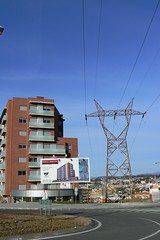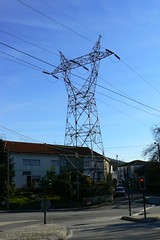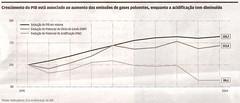Public consultation of GM maize in Portugal
I just participated in an ongoing public consultation on GM maize in Portugal that is open until March 1 2007 (ie thursday). I sent my comments to "Exmo Sr Presidente de Instituto do Ambiente" via email to cpogm at iambiente dot pt.
Read about it here.
My letter is as follows:
Contributo do Johan Benesch para o processo de Consulta Pública relativo às notificações para a libertação deliberada multi-anual de plantas geneticamente modificadas –
Processos B/PT/06/06 e B/PT/07/01.
Espero e desejo que a decisão final sobre estes dossieres seja efectivamente norteada pelo Princípio da Precaução e que o aspecto da irreversibilidade de qualquer libertação ambiental de transgénicos, tal como reconhecido pela Directiva 18/2001/EC , seja sentido e prevaleça sobre miragens tecnológicas desnecessárias e arriscadas.
Abreviatura: GM - geneticamente modificado/a/os/as
Comentários em geral
1.Qual importância tem o Princípio da Precaução em Portugal? Se há uns casos óbvios para aplicação do Princípio da Precaução, são estes.
2.Avaliação destes tipos de projectos deve ser feito em base científica e experiências prévias.
3.O que diz a legislação portuguesa sobre os interesses ambientais na agricultura?
4.O que diz a legislação portuguesa sobre a comparação entre as tecnologias novas e as melhores práticas ( ou seja benchmarking) na agricultura?
5.O que diz a legislação portuguesa sobre a substitição dos métodos ou dos materiais que têm impactos negativos (na saúde humana e no ambiente) por métodos ou materiais que têm um melhor impacto para o ambiente? Ou seja, o Princípio da Substitução.
6.Por que são os sequenciais NDA (DNA) são classificados como CBI? Devem ser descritos nas patentes!
7.Ambos os pedidos não incluem expêriencias doutros países sobre os impactos ambientais destes tipos de produtos e especificamente destes GMs
8.Ambos pedidos não incluem os efeitos ambientais negativos que resultam do uso estes tipos de GM e que são muito bem conhecidos.
9.Especificamente ambos os pedidos não incluem os efeitos negativos ambientais que um uso mais intenso de herbicidas pode ter. Isto é muito importante por que ambas produtos são desenvolvidos para tolerar uso mais frequente e aplicações mais fortes de herbicidas! Também há um “factor de conveniência” que permite aos agricultores aplicarem mais herbicidas e mais frequentemente e que não está descrito nestes pedidos.
10.Usualmente plantas GM (para tolerância de herbicidas) são mais susceptíveis a períodos prolongados de seca de que plantas normais.
11. Experiências prévias mostram a ineficácia de um limite de 400 metros entre GM e os campos com plantas normais.
12.Em ambos os pedidos faltam quaisquer dados sobre os efeitos ambientais (negativos) do uso de plantas GM e em conjunto com o uso de herbicidas.
13.Em ambos pedidos faltam quaisquer informações sobre outros pedidos semelhantes noutros países europeus.
14.Em que sentido são +6 graus muito frio para milho?
15.Em ambos os pedidos faltam planos de seguros para pagamento e indemnização de custos por causa de contaminação GM nas plantas normais de milho nos campos circunvizinhos (Polluter Pays Principle).
16.Em ambos os pedidos faltam planos para monitorização de polém GM nos campos circunvizinhos.
17.Em ambos os pedidos faltam informações sobre os efeitos tóxicos ou nocivos, que podem afectar por exemplo a comida para gados.
18.Em ambos os pedidos faltam descrições sobre os planos de aplicações de herbicídas durante os ensaios (frequência, concentração etc).
19.Em ambos os pedidos faltam planos de estudo sobre os efeitos ambientais dos herbicídas que vão ser usados.
20.Em ambos os pedidos faltam planos de estudo sobre ervas daninhas e estudos sobre a insurgência (ou seja possivel aumento) de ervas daninhas com tolerância aos herbicidas usadas.
21.Até agora os GM de milho que foram desenvolvidos para serem resistentes aos herbicidas ainda não mostraram nenhum efeito positivo no rendimento da colheita no longo prazo. Provavelmente, muito pelo contrário, falham porque confiam somente em um mecanismo de combate às ervas daninhas que desenvolvem razoavelmente resistência aos herbicidas. GM plantas também são um custo adicional para os agricultores.
22.Syngenta e Pioneer parecem desconhecer literatura ciêntifica sobre os efeitos negativos para o ambiente destes tipos de GM e o uso em conjunto das herbicidas. Os seguintes relatórios são muito ilustrativos e contêm vários artigos de jornais ciêntificos:
I.“Impossible coexistence” de Greenpeace, Abril 2006;
http://www.greenpeace.org/international/press/reports/impossible-coexistence
http://www.greenpeace.org/raw/content/international/press/reports/impossible-coexistence.pdf
II.“Who benefits from gm crops? An analysis of gm crops (1996-1006) de o FOEI, 2007, http://www.foei.org/media/2007/0109.html
http://www.foei.org/publications/pdfs/gmcrops2007execsummary.pdf
http://www.foei.org/publications/pdfs/gmcrops2007highlights.pdf
III.“The Case for A GM-Free Sustainable World” de ISP 2003;
http://www.indsp.org/ISPreportSummary.php
http://www.indsp.org/A%20GM-Free%20Sustainable%20World.pdf
Especificamente por Syngenta
23.O uso do glifosato não é um novidade. É usado há algumas décadas (desde ca 1970).
24.Os objectivos são de avaliar resíduos de glifosato, selectividade e eficiência do glifosato para o GM milho GA21. A empresa Syngenta já sabe tudo sobre isto, do conhecimento que tem de outros campos com áreas semelhantes como seja o clima. Por que razão quer a Syngenta realmente fazer este ensaio?
25.Na análise sobre os efeitos ambientais falta qualquer referência aos conhecimentos sobre os efeitos ambientais negativos do milho com tolerância contra glifosato que também é provavelmente usado com mais frequência neste caso.
Especificamente por Pioneer
26.Este variedade de GM milho tem o dobro da resistência ou seja tem resistência contra dois tipos de herbicidas. Isto sugere a ocorrência de ervas daninhas resistente a um ou a outro tipo de herbicida. A empresa Pioneer esta a incentivar o ocorrência de super ervas daninhas, ou seja de ervas daninhas multi-resistentes?!
27.O Pioneer diz que efeitos ambientais negativos deste GM milho ainda não são registados. Mas como é que é os efeitos têm sido estudados? Há estudos sobre qualquer um estes tipos de tolerância?
28.O parecer da Plataforma OGM Fora de Prato de 2006 sobre ensaios de campo de Pioneer também contém informação muito importante sobre a empresa Pioneer e os ensaios dela.
Labels: 98140-6, GA21, GM, GMO, maize, Monsanto, Pioneer, Portugal, public consultation, Syngenta












